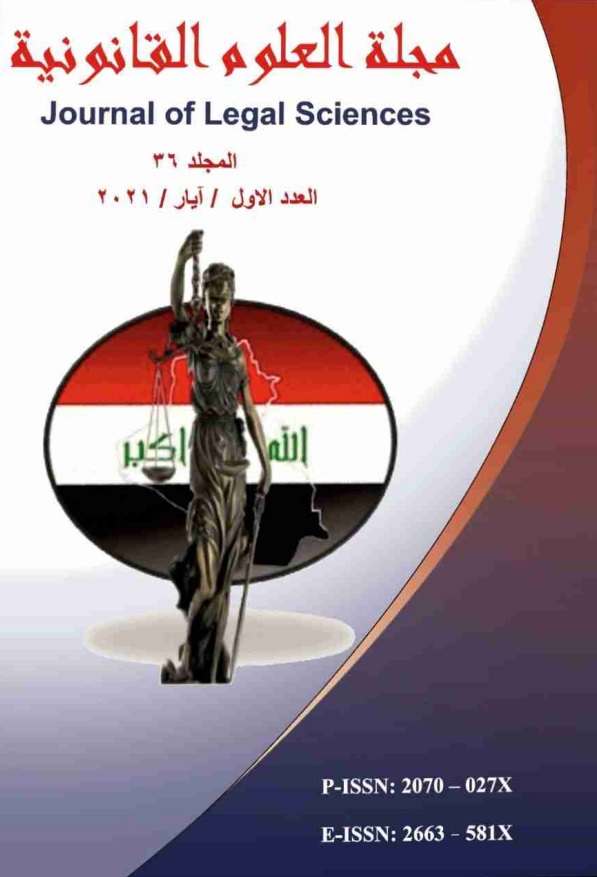Legal vision for international financial institution transactions
DOI:
https://doi.org/10.35246/jols.v36i1.382Keywords:
financial institution, transactionsAbstract
The increasing restrictions imposed on foreign banks operating in developing countries since the 2007/2007 global financial crisis impede improving growth prospects by limiting the flow of financing resources that are desperately needed by companies and the family sector.
Global banks can have important development benefits، but they are not a panacea, and they also carry risks. Policymakers in developing countries are improving by examining how to maximize the benefits of cross-border banking services while keeping their costs down to a minimum. The 2007-2009 crisis and its ensuing decline in economic activity prompted a widespread reassessment of the benefits and costs of international banking and led to the imposition of Restrictions that have impeded the ten years of globalization of financial services and cross-border lending. However, developing countries may need to reconsider the value of global banks as important gates of global credit and accelerate economic growth even as they continue to manage risk.
As ambitions continue to increase around the world، and the banking sector develops، there is a crucial question: Will financing be a friend or enemy in the struggle to end poverty?.. Global banks create risks of exporting instability, especially for countries with weak systems and institutions، and must be mitigated. The severity of these risks. But without a competitive banking sector، the poor will not have access to basic financial services، many companies will exit the market، and growth in developing countries will stall. ”
Bank financing is essential for a vibrant private sector، especially for nurturing small and medium enterprises. Developing countries can derive the maximum benefits from a stronger banking system while providing protection from risks by improving information sharing across credit records، vigorously enforcing property and contract rights، and ensuring strong supervision of banks.
With developed country banks in decline after the crisis، developing country banks have filled the void and expanded across borders، accounting for 60 percent of new banking restrictions since the downturn. The result has been an increase in banking relations between developing countries and the regionalization of international banking operations.
Downloads
References
Downloads
Published
Issue
Section
License
Copyright and Licensing:
For all articles published in Journal of Legal Sciences, copyright is retained by the authors. Articles are licensed under an open access Creative Commons CC BY 4.0 license, meaning that anyone may download and read the paper for free. In addition, the article may be reused and quoted provided that the original published version is cited. These conditions allow for maximum use and exposure of the work.
Reproducing Published Material from other Publishers: It is absolutely essential that authors obtain permission to reproduce any published material (figures, schemes, tables or any extract of a text) which does not fall into the public domain, or for which they do not hold the copyright. Permission should be requested by the authors from the copyrightholder (usually the Publisher, please refer to the imprint of the individual publications to identify the copyrightholder).
Permission is required for: Your own works published by other Publishers and for which you did not retain copyright.
Substantial extracts from anyones' works or a series of works.
Use of Tables, Graphs, Charts, Schemes and Artworks if they are unaltered or slightly modified.
Photographs for which you do not hold copyright.
Permission is not required for: Reconstruction of your own table with data already published elsewhere. Please notice that in this case you must cite the source of the data in the form of either "Data from..." or "Adapted from...".
Reasonably short quotes are considered fair use and therefore do not require permission.
Graphs, Charts, Schemes and Artworks that are completely redrawn by the authors and significantly changed beyond recognition do not require permission.
Obtaining Permission
In order to avoid unnecessary delays in the publication process, you should start obtaining permissions as early as possible. If in any doubt about the copyright, apply for permission. Journal of Legal Sciences cannot publish material from other publications without permission.
The copyright holder may give you instructions on the form of acknowledgement to be followed; otherwise follow the style: "Reproduced with permission from [author], [book/journal title]; published by [publisher], [year].' at the end of the caption of the Table, Figure or Scheme.










